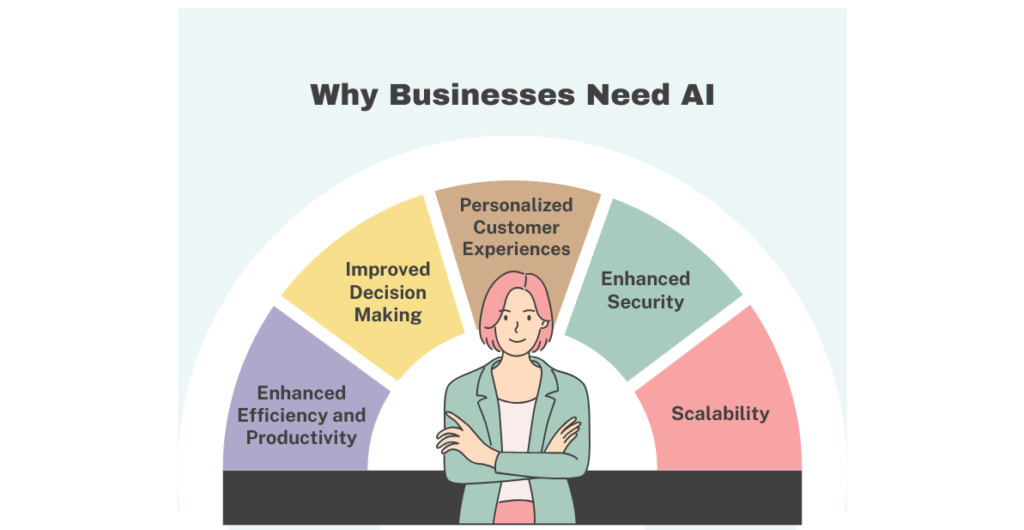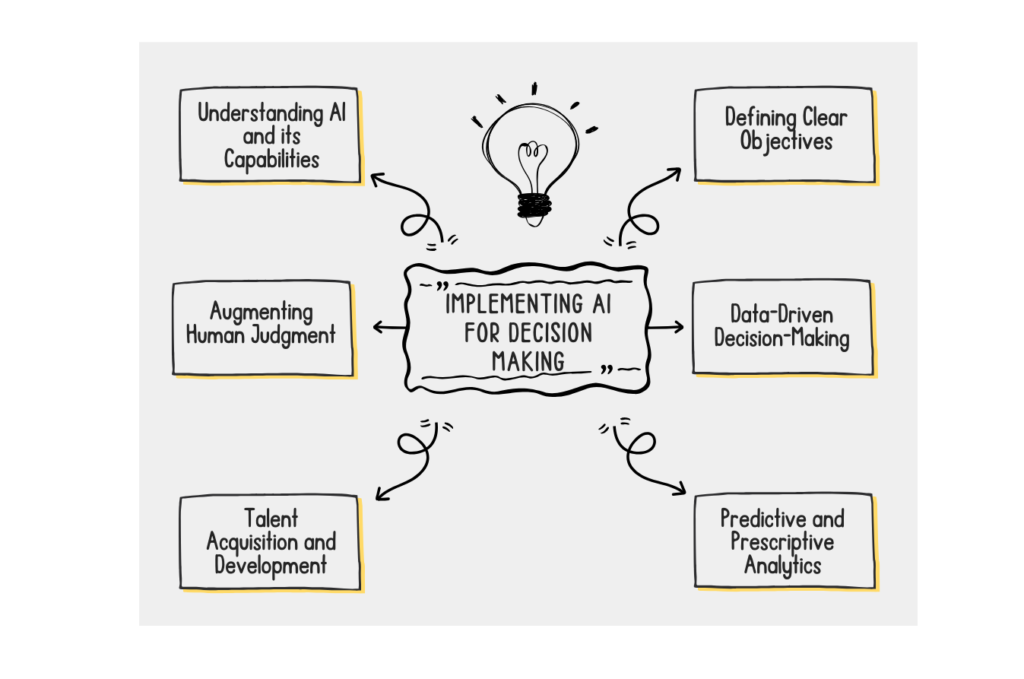CEOs must adopt the change driven by artificial intelligence (AI) and be ready to navigate its challenges and potential. They should focus on strategic moves – encouraging ecosystem collaboration, strategizing investment in technology, and developing AI talent.

Artificial Intelligence (AI) has the potential to redefine the future of work and the workforce, as it offers unprecedented opportunities for CEOs to drive innovation and efficiency. AI is a catalyst for smarter, faster decision-making processes, enabling CEOs to make the most out of this revolutionary technology.
Looking at the reports, more than 80% of global companies, in 2023, reportedly adopted AI to improve their business operations. AI has transformed various industries and business processes by automating repetitive and mundane tasks. To navigate the complexities of AI adoption and maximize its full potential, CEOs must focus on fostering collaboration, talent acquisition and development, and innovation culture.
As we are shifting to a new era, AI is poised to present unprecedented opportunities as well as challenges that require astute leadership and strategic vision. “We see organizations leveraging AI for use cases where I believe the technology can most quickly have a profound impact like IT automation, digital labor, and customer care”, said Rob Thomas, Senior Vice President at IBM Software.
Also Read: Generative AI: The CFO’s Path to High ROI
The Strategic Imperative of AI
With technological advancements, AI has moved from the periphery of business operations to the core of strategic decision-making. Embracing this technology effectively can position a company ahead of the competition and determine its sustainability. The adoption of AI requires a considerable approach and a deep understanding.
However, many CEOs work on traditionally focused business objectives and may lack the necessary technological skills and insights to make informed decisions. A recent Deloitte/Fortune CEO survey revealed that over half of organizations are deploying Generative AI to accelerate automation and increase efficiencies. Conversely, some CEOs are lagging in integrating AI into their business strategies effectively.
CEOs must bring a balancing approach to harness the potential of AI to optimize operations and enhance customer experiences while creating new revenue streams. Those who fail to stay updated with the latest technological trends of AI may find themselves outperformed by more agile and forward-thinking businesses.
Also Read: How Artificial Intelligence Can Power Corporate Social Learning
Unlock the Power of AI to Transform Operations and Efficiency
One of the most significant benefits of AI is its capacity to streamline operations and improve efficiency. AI algorithms can examine vast sets of data in real-time and provide businesses with patterns and insights that humans might miss. This can seriously help CEOs make smarter and faster decisions, minimize operational costs, and enhance resource allocation.
In a Cisco survey, 83% of executives consider AI as a strategic priority for their organizations. While 75% believe it will allow them to shift into new businesses and ventures.
Why do Businesses Need AI?
AI can potentially transform the landscape of business operations, providing executives with a myriad of benefits to drive innovation, efficiency, and growth. Let’s have a look at why businesses need AI:

Enhanced Efficiency and Productivity: As AI can automate repetitive tasks, human workers have more time to focus on complex and strategic activities. This will help drive efficiency and productivity.
Improved Decision Making: AI can process and evaluate large datasets at a breakneck pace. This provides businesses with valuable insights, helping them make informed decisions.
Personalized Customer Experiences: With AI, businesses can enrich every customer experience by delivering more engaging, personalized marketing and customer service and interaction.
Enhanced Security: AI can help in identifying and responding to security threats in real-time. This protects businesses from fraudulent activities, cyber-attacks and data breaches.
Scalability: AI systems enable businesses to easily scale to manage increased workloads. This can support business growth without a proportional increase in costs.
Also Read: The Evolution of Work in the Digital Economy: What Lies Ahead?
Challenges of Implementing AI for Smart Decision-Making
While embracing AI offers numerous benefits, it also presents numerous challenges. Some of the common challenges faced by CEOs are as follows:
Technical Challenges
- Data Quality and Integration
- Scalability
- Technical Expertise
- Integration with Legacy Systems
Organizational Challenges
- Change Management
- Leadership Support
- High Initial Investment
- Collaboration Across Departments
Ethical and Regulatory Challenges
- Ethical Concerns
- Regulatory Compliance
- Transparency and Trust
- Accountability
Strategic Challenges
- Alignment with Business Goals
- Innovation vs. Stability
- Continuous Learning and Adaptation
Strategic Moves for CEOs to Implement AI for Decision-Making

CEOs need to bring a strategic approach while implementing AI for decision-making.
- Investing in training for top management is crucial. They should engage AI experts and conduct workshops and seminars.
- They must foster an ecosystem of collaboration to stay at the forefront of AI advancements.
- Defining clear objectives for AI implementation can add value such as enhancing customer service and improving marketing strategies.
- Investing in data cleaning, integration, and management tools is essential for AI implementation. It ensures data is collected and stored systematically, adhering to relevant regulations.
- Generating in-house AI talent is crucial for sustained growth and innovation. This can be done by encouraging continuous learning and upskilling.
Prepare the Workforce of Tomorrow
The potential of AI is undeniable. Effectively harnessing this potential to prepare for a future workforce, business leaders must take strategic approaches to navigate the complexities of AI adoption and implementation and position their organizations for sustained growth in the future.
Also Read: Spatial Computing in The Enterprise Transforming Workplace Productivity
The Bottom Line
Artificial Intelligence (AI) will continue to evolve with rapid technological advancements. It represents the next frontier for CEOs and industry leaders seeking to maximize their organization’s potential. They can bring innovation to their organization and transform operations by strategically implementing AI.
It is no surprise that making the most of AI comes without challenges. However, with visionary leadership and a proactive approach, CEOs can turn AI into their next big thing, taking their companies to a new height.
Are you a CEO, a business executive, or a professional? Think about how can you implement AI to maximize your ROI. What opportunities do you see AI would bring to your organization? What would be the next big thing after AI in business? Comment your thoughts and join the conversation.
For more latest insights and news, stay connected to The Future Talk.